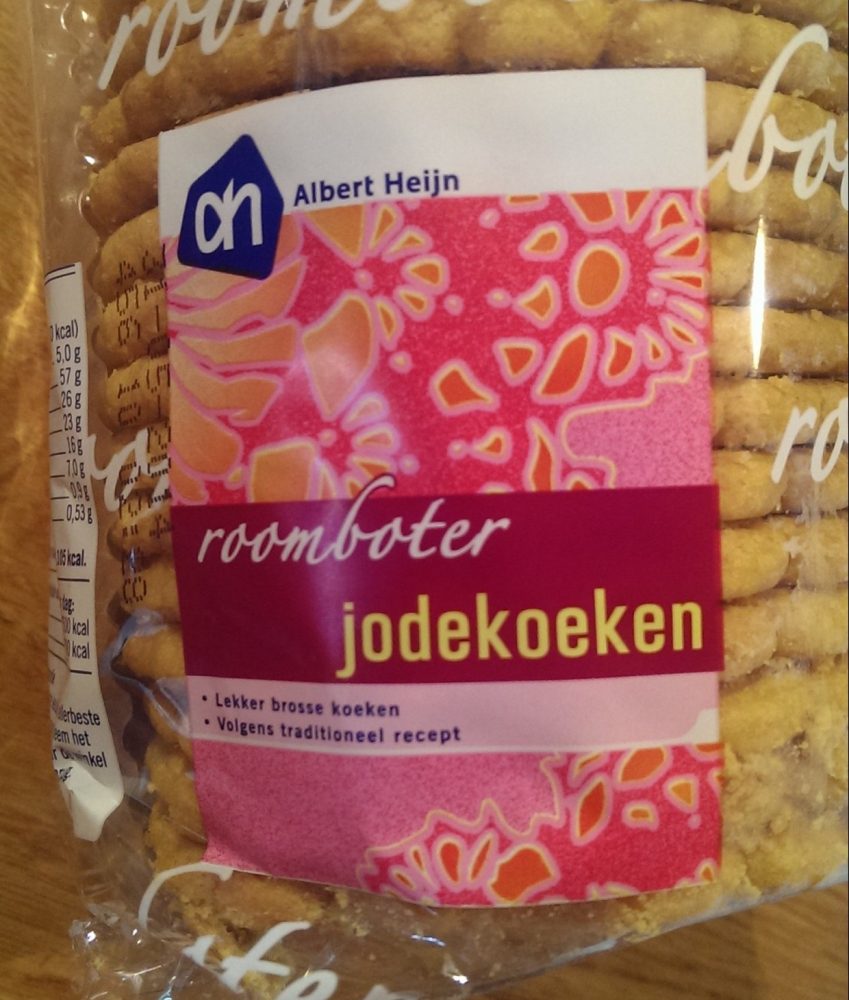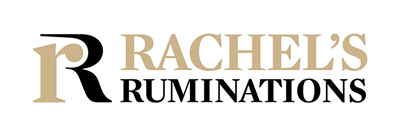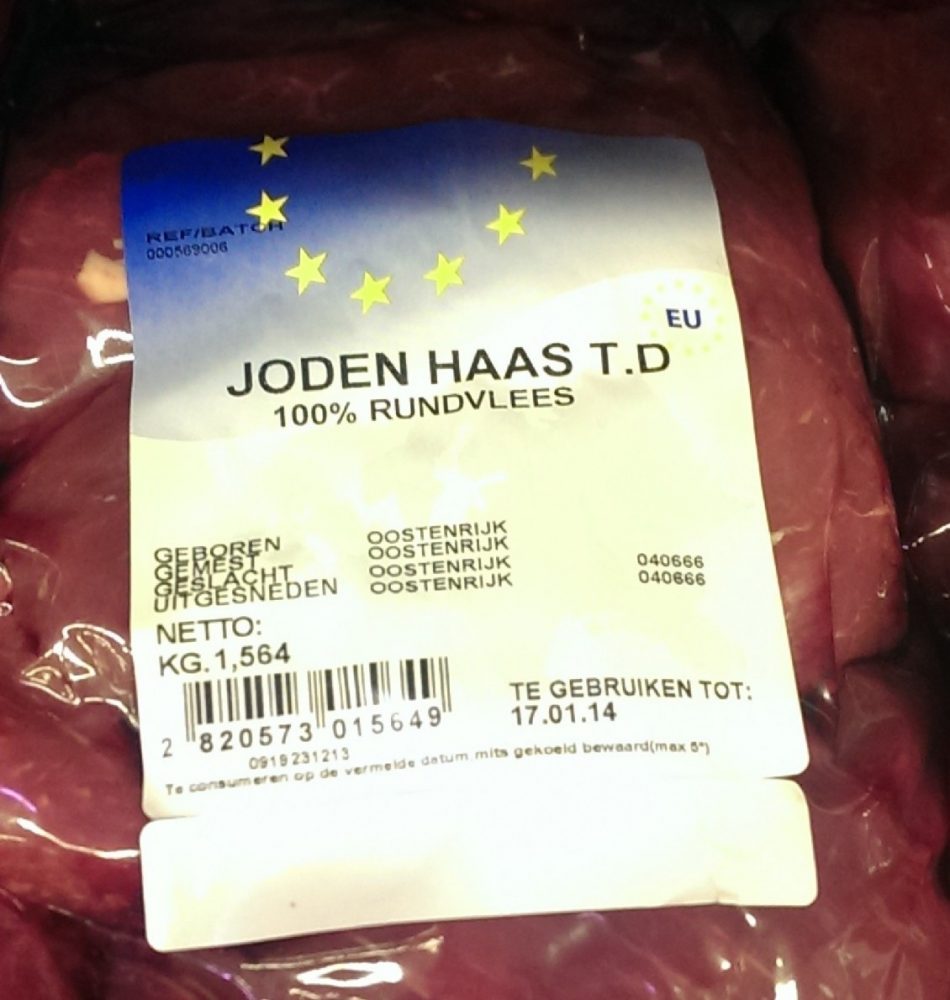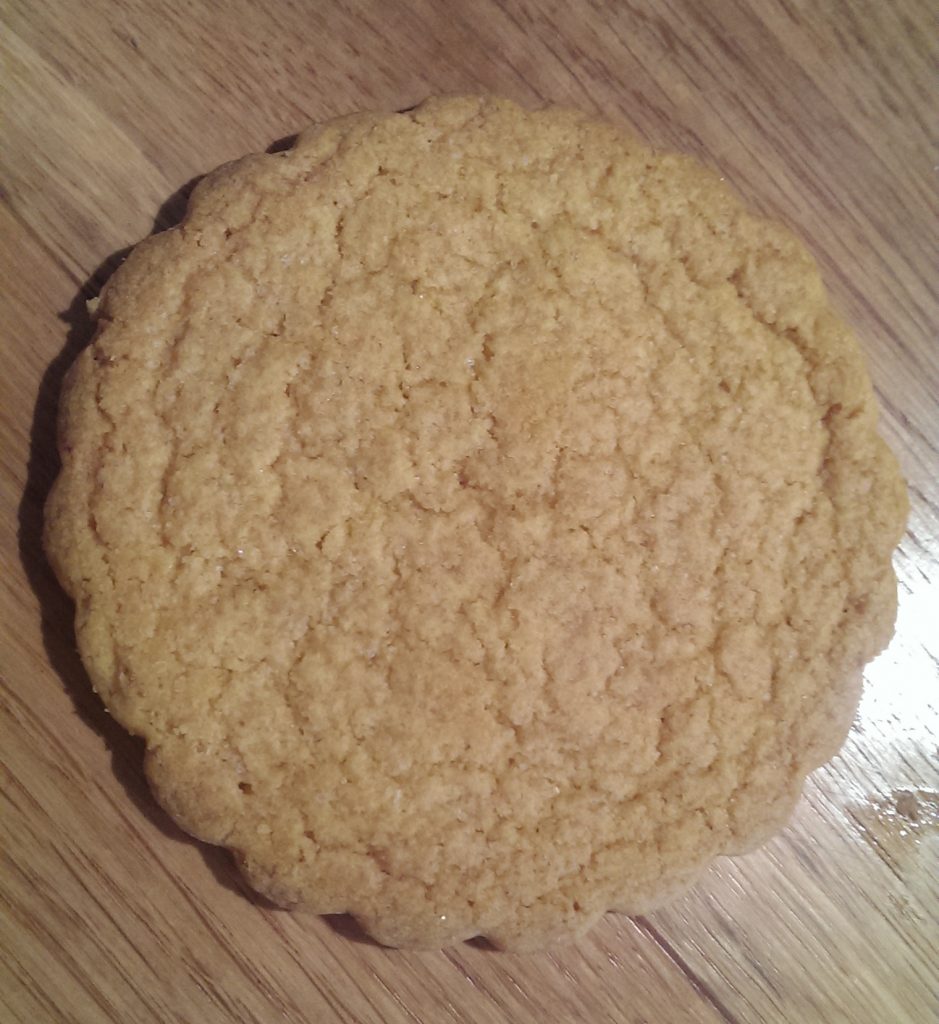Jew cookies and Negro kisses
I was shopping in a big warehouse store the other day and came across a package of beef labeled Joden haas, which stopped me in my tracks. You see, joden is the Dutch plural for jood, which means “Jew.” Haas is a particular cut of beef: a shoulder tender. So jodenhaas (Apparently it’s correctly spelled as one word.) means “Jews cut of beef.”
I’ve written in the past about the controversy over the Dutch traditional character Zwarte Piet. I came to the conclusion that it doesn’t matter what the history of the tradition is, whether it is benign or not, or what the intention of the people practicing it is. If it is experienced by other people, particularly a whole ethnic group of people, as offensive, it should be stopped, or, in Zwarte Piet’s case, changed.

Jodenhaas is not the only food containing a Jewish reference in the Netherlands. We also have jodenkoek (sometimes spelled as jodekoek) which translates literally as “Jews cookie.” It’s a very big, flat, butter cookie. According to Wikipedia—the font of all knowledge—there are five possible stories for why it has that name:
- It was invented by a Jewish baker in Amsterdam in the 1920’s, or was first sold by a Jewish baker in Enkhuizen.
- It was actually a non-Jewish baker with the last name de Joode.
- The cookie is big but thin, so you could produce something that looked big cheaply. Products that were cheap were often called Jewish, which could be interpreted as a reference to Jews being stingy, or to Jews being poor.
- The cookies are flat and resemble matzah.
- The cookies are shaped like a yarmulke.
Jodenhaas and Negerzoenen
A similar situation came up a decade ago concerning the sweet called negerzoenen, which hit the news when it—or rather its name—was withdrawn from the market in 2006. Neger translates as “negro,” and used to be an accepted word for a black person, just as “Negro” was accepted in the US in the 1960’s. While many have abandoned its use as offensive to blacks (also because of its similarity to the English word “nigger”), many still accept it and use it as a relatively neutral term.
Negerzoenen, then, means “negro kisses” and is the word for a sweet that I knew as “mallomars” as a child. It’s a thin flat cookie covered with marshmallow, which is then covered with a thin layer of chocolate. It’s not clear why it has this name, but Wikipedia quotes the Dutch makers as saying that if you eat it, your lips turn brown, and if you then kiss someone, that’s a neger’s kiss.
The name was changed to simply zoenen – kisses – in 2006 in order to avoid offense. Many white Dutch people were appalled at the change, just as they opposed changing the Zwarte Piet tradition this year.
Is “jodenhaas” offensive?
So am I offended by the term jodenhaas? My initial reaction was, yes, I am. When I first saw that package, it implied to me a reference to Jews as meat, something to be killed and consumed. In this country, where so few Jews survived the Holocaust, is even the hint of such a meaning acceptable?
Yet that isn’t what it means: according to Wikipedia, anyway. It says that Orthodox Jews did not eat any hindquarters of beef. Since the kosher laws do not permit eating the sciatic nerve or any nearby blood vessels, kosher butchers generally sold that part to non-kosher butchers rather than going through the bother of removing them. For this reason, Jews tended to buy shoulder meat, the jodenhaas.
That, to me, isn’t offensive. It’s a reference to a Jewish tradition, but doesn’t seem judgmental or derogatory to me. And of the possible jodenkoek explanations, only the third is derogatory.
Yet something about both of these names bothers me. Somehow they just feel like negerzoenen and Zwarte Piet must feel to blacks. Naming foods after characteristics of an ethnic group makes us feel excluded, separate from the rest of the population. We Jews don’t all keep kosher anymore. We aren’t Shylocks. We, along with any immigrants who have come here to stay, are part of this society as much as ethnically Dutch people are.
With such names, we become the “them” in “Us versus Them.”






Could the term simply mean black in color? I can understand some awkwardness in not wanting to offend. It is for certain very interesting!
You mean in negerzoenen? I don’t think so, or at least only to the extent of meaning black skin color. The word neger refers to people. Zwart is the word for black. Thanks for commenting!
OK, then justify Engelse drop, because I can’t !
Haha! No idea! Doesn’t it come from England? And what about filet americain? (that’s pureed raw beef). I don’t think any American eats that!
Ha, I also think it’s strange when i see things labeled as ‘american’ style and it’s something we didn’t do/have in the states. Filet American is a good example and at a pancake house there was an ‘american’ style of pancake that assorted toppings that didn’t seem characteristically american to me.
In Sweden, the black pastry looks like nipples, and the name was only phased out during the early 2000’s
Judekakker are popular in Norway, but I haven’t seen them in Sweden.
So they’re not uniquely Dutch things!
I’m so not in agreement with your last statement “ With such names, we become the “them” in “Us versus Them.” And your statement about Jews being excluded from society by the jodenkoek product name.
It is exactly the other way around! By having these names refer to these products you contain Jews as part of the Dutch history, in the form of this delightful cookie (which is also a very positive one). Taking out the name automatically removes this piece of history. It removes the chance of our kids to ask ‘why is that called a Jew cookie?’ and thus the chance to have an open discussion about it. Same goes for negerzoenen. The exclusion that you fear is hereby initiated and thus has the opposite effect.
Why are we making this all so difficult in our society? It’s a damn good cookie. I enjoy it regularly and it have absolutely no negative associations to Jews because of it.
On the contrary!
I agree the cookies are good, though a little dry for my tastes. But I was writing about how I feel that the name of my ethnic group is used to name a food item by people who are mostly NOT in that ethnic group. Just as with negerzoenen, it FEELS hurtful. Just like the whole Zwarte Piet debate, just because the intention might be pure (which I agree in the article, the intention is not anti-Semitic), that doesn’t change the effect it has on people. Not intending to be racist or anti-Semitic doesn’t mean it’s not racist or anti-Semitic. I don’t see why using names like Jodenkoek and Negerzoenen are necessary to have open discussions about anti-Semitism or racism. The history is there either way.
Hi…I am German …grew up in Berlin…loved Negerküsse ! Name has been changed, product is the same. Also loved Amerikaner from the Bakery ( 50s through 70s , a cute thank you to all the GIs in town !):large , soft dough cookie, after baking turned over and iced on the flat side: half white sugar icing , half chocolate ! I have not seen these on my recent visits.